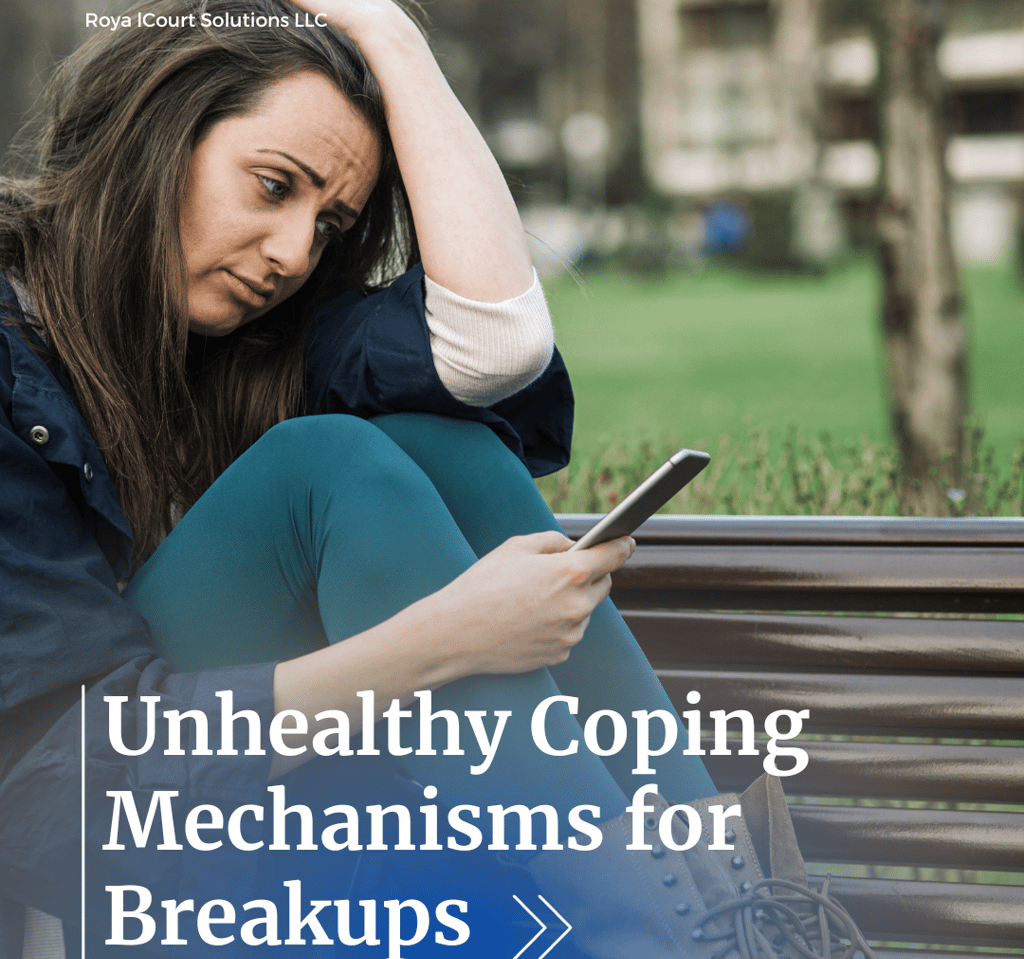Unhealthy Coping Mechanisms for Breakups
Unhealthy coping mechanisms for breakups: denial, excessive alcohol use, emotional eating, rebound relationships, obsessive social media stalking, isolation, self-destructive behaviors, seeking revenge, suppressing feelings, constant contact with ex. Find healthier alternatives for healing and growth.
Coach Clarice Corinn
4 min read


Amid heartbreak, it's natural to seek solace and find ways to cope with the pain. However, not all coping mechanisms are healthy or beneficial in the long run. When faced with a breakup, some of the unhealthy coping mechanisms that people often turn to include excessive alcohol consumption, reckless behavior, self-isolation, and excessive social media stalking. These methods may provide temporary relief or distraction, but they ultimately hinder the healing process and prolong the pain. To truly move forward and thrive, it's important to identify and replace these unhealthy coping mechanisms with healthier alternatives that promote emotional well-being and personal growth.
What are unhealthy coping mechanisms for breakups?
Breakups can be incredibly challenging and emotionally draining experiences. It's natural to feel a wide range of emotions during this time, such as sadness, anger, and confusion. While it's important to acknowledge and process these emotions, it's equally vital to address them in healthy ways. Unfortunately, some coping mechanisms can be detrimental to our well-being and hinder the healing process. In this article, we will explore ten unhealthy coping mechanisms for breakups and discuss why they are detrimental to our emotional and mental health.
1. Denial and Avoidance
Denial and avoidance are common coping mechanisms for breakups, but they can be incredibly harmful in the long run. By refusing to acknowledge the pain and emotions associated with the breakup, we may delay the healing process and hinder our ability to move forward. It's crucial to give ourselves space to grieve and process our emotions instead of burying them deep down.
2. Excessive Alcohol or Substance Use
Using alcohol or substances as a way to cope with the pain of a breakup is not only unhealthy but can also lead to long-term consequences. While it may provide temporary relief or numb the pain temporarily, excessive alcohol or substance use can lead to addiction and other physical and mental health issues. It's important to seek healthier alternatives for coping and consider reaching out to a therapist or support group for additional support.
3. Emotional Eating
Emotional eating or using food as a way to cope with emotions, is another unhealthy coping mechanism that can have negative impacts on our physical and mental health. While indulging in comfort foods may feel soothing at the moment, it can lead to unhealthy eating habits, weight gain, and a cycle of guilt and shame. Finding healthier ways to cope with emotions, such as engaging in physical activity or practicing mindfulness, can be more beneficial in the long run.
4. Rebound Relationships
Jumping into a new relationship immediately after a breakup can be tempting, as it provides a temporary distraction from the pain and loneliness. However, engaging in a rebound relationship without taking the time to heal and reflect can not only be unfair to the other person involved but can also hinder our personal growth. It's important to take the time to heal and discover the ways we have transformed from our experiences before entering into a new relationship.
5. Obsessive Social Media Monitoring
In today's digital age, it's easy to fall into the habit of obsessively monitoring our ex-partner's social media accounts. However, constantly checking their posts and updates can prolong the healing process and keep us stuck in the past. It's important to take a break from social media if necessary and focus on our healing and growth instead of comparing ourselves to our ex-partner's online presence.
6. Isolation and Withdrawal
While it's important to take time alone to process and heal after a breakup, isolating ourselves for an extended period can be detrimental to our mental and emotional well-being. Connecting with friends and loved ones, seeking support from a therapist or support group, and engaging in activities that bring us joy can help break the pattern of isolation and promote healing.
7. Self-Destructive Behaviors
Engaging in self-destructive behaviors, such as self-harm or reckless behavior, is an incredibly unhealthy coping mechanism that can have severe consequences. These behaviors not only harm our physical well-being but also perpetuate a cycle of self-destructiveness and hinder our ability to heal and move forward. If you find yourself engaging in self-destructive behaviors, it's essential to reach out for professional help immediately.
8. Seeking Revenge
The desire for revenge is a common reaction to the pain and anger associated with a breakup. However, seeking revenge only perpetuates negative emotions and can have legal and personal repercussions. Instead of focusing on revenge, it's important to focus on healing and personal growth. By seeking revenge, we only hold ourselves back from moving forward and finding true happiness. Instead, focus that mental, emotional, and physical into building the life you dream of. That way, you ensure a greater return on your investment.
9. Suppressing or Ignoring Feelings
Suppressing or ignoring our feelings can seem like a tempting way to avoid the pain after a breakup. However, this coping mechanism only delays the healing process and can lead to unresolved emotional issues in the long run. It's crucial to give ourselves permission to feel and express our emotions in healthy ways, such as talking to a trusted friend or therapist.
10. Constant Contact with the Ex
Maintaining constant contact with an ex-partner after a breakup, whether it's through phone calls, texts, or social media, can be incredibly harmful to our healing process. It prevents us from creating healthy boundaries and moving on with our lives. Cutting off contact, at least temporarily, can allow us to focus on our own healing and establish new routines and connections.
In conclusion, it's important to recognize that not all coping mechanisms for breakups are healthy or beneficial to our well-being. By addressing our emotions and finding healthier ways to cope, we can navigate the healing process with grace and resilience. Seeking support from loved ones, therapists, or support groups can provide valuable guidance and help us on our journey towards healing and personal growth. Remember, you deserve to heal and thrive after a breakup, and by making conscious choices to prioritize your well-being, you can create a brighter future for yourself.
© 2025 Royal Court Solutions LLC. All Rights Reserved.
Transformative Models of Healing (TMH)™ is proprietary intellectual property of Clarice Corinn Bennett and Royal Court Solutions LLC.
111 N 6th St, #1662
Rockford, IL 61110
Coaching & Services
Legal
Email: Support@RoyalCourtSolutions.com
Phone: (608) 313-5325


